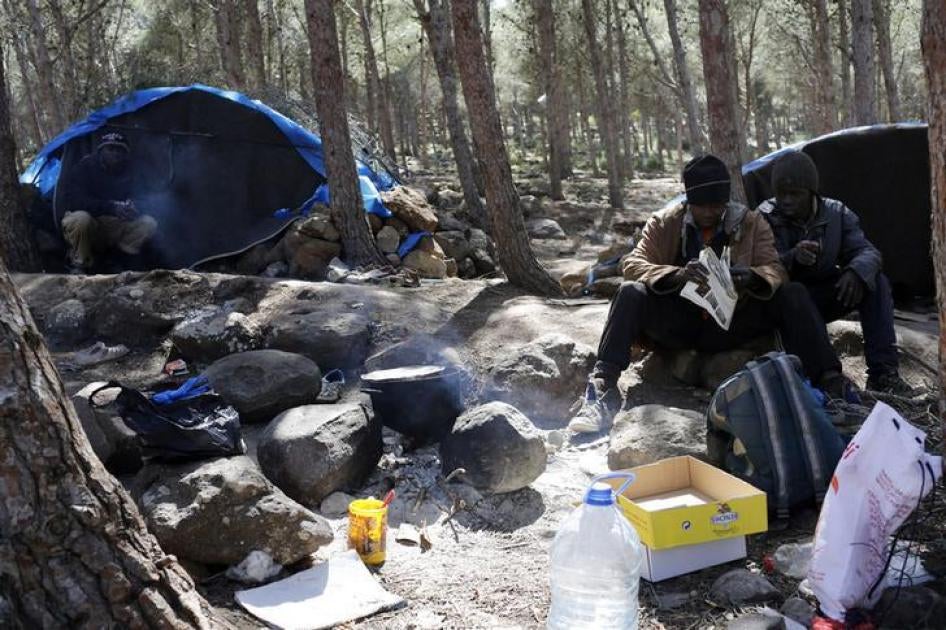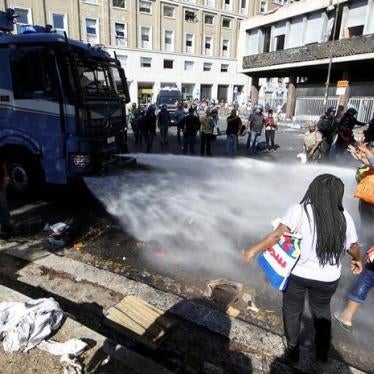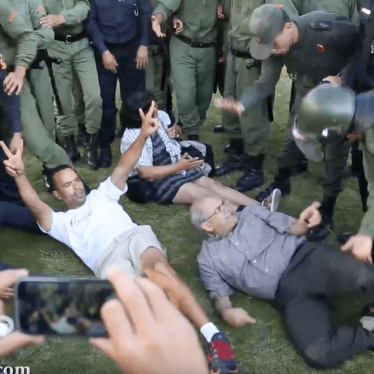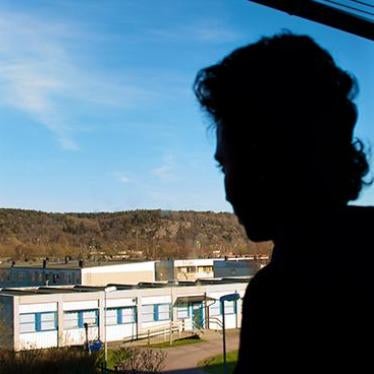“We had to get up at 4 in the morning to avoid the police. They caught me five or six times. They beat me with their batons. If you fall, they beat you. Each time, they sent me to Tangiers, Casablanca or somewhere else far away.”
Eighteen-year-old Emmanuel’s horrendous experience at the hands of the Moroccan police is a foreseeable consequence of Spain’s emphasis on deterrence and outsourcing of border control while turning a blind eye to Morocco’s abuses against migrants. This model also serves as an unfortunate blueprint for the European Union’s current approach to migration and asylum.
In 2015, Spain formalized in its law the longstanding practice of summary returns of would-be asylum seekers to Morocco, a move that breaches EU and international law. Spain’s close border control cooperation with Morocco, and wider EU investment in “effective migration management” in that country carries lessons as the EU pursues similar engagement with other countries, including Turkey and Libya. Morocco has taken positive steps but has yet to establish a national asylum system, and many of the abuses documented by Human Rights Watch in 2012 and by others continue.
Over the past few months, I have spoken with dozens of sub-Saharan men and boys in Ceuta and Melilla, Spain’s enclaves in North Africa, and various places on the Andalusian coast. Many told me of distressing personal circumstances that led them to leave their countries. All had horror stories of violence and hardship on their journeys, and particularly about police abuse in Morocco.
Men, women, and children hoping to reach Europe often live for months in makeshift camps in forests and grottos in Morocco near Ceuta and Melilla waiting for a chance to scale the fences into the enclaves, or to take an inflatable raft, sometimes without a motor, across the sea to mainland Spain. Moroccan police regularly raid the camps, destroy tents and belongings, and round up anyone they can catch for transfer to another part of Morocco, far from the enclaves and the coast. The migrants are normally left at a bus station or simply on the streets. Many told me they resorted to begging to scrape together the money to return to the area near the enclaves.
Yaya, a 16-year-old from Guinea, tried nine times to scale the double-layer fences topped with razor-wire surrounding Ceuta. He reckons he made it into Spanish territory four or five times. Each time he was quickly sent back to Morocco even though he is a child and entitled to special protection. On other occasions Moroccan Auxiliary Forces, a paramilitary force that patrols the perimeter, caught him before he reached the fences, beating him with their batons every time.
Foday, a 20-year-old from Sierra Leone, was caught three times as he tried to scale the three-deep fences that surround the Melilla enclave. “The first time the Moroccans caught me and they flogged me. The second time, the same. They used a very strong stick...The third time I got over two fences, and the [Spanish] Guardia Civil caught me. They didn’t flog me, they handed me to the Moroccans.”
Those who make it to the enclaves are placed in open centers where the likelihood of delayed or denied transfer to the mainland serves as a disincentive to applying for asylum. Those who reach the mainland by sea face abysmal conditions in police facilities upon arrival and virtually automatic detention pending deportation.
The situation illustrates a key problem with EU migration cooperation with other countries: reliance on Morocco to keep people away gives Spain and the EU an incentive to tolerate Morocco’s abuse of migrants. Spain and Morocco have the right to control their borders, but not with such brutality and disregard for people’s rights.
Spain should ensure that people can apply for asylum and receive a fair examination of their application and decent reception conditions—whether on the mainland or its north African enclaves. It should scrap the law that allows it to summarily return those who enter the enclaves. Spain should do more to provide safe and legal channels to enter the country, including through increasing the pitifully low number of refugees it resettles and making it easier for people to apply for humanitarian visas from its embassies and consulates. Madrid should also publicly condemn Moroccan authorities’ abuses against migrants and asylum seekers and work with Rabat to tackle them.
For its part, Morocco should put a stop to abusive, unannounced raids on migrant camps and investigate all allegations of excessive use of force by police and the Moroccan Auxiliary Forces during these raids and at the enclave fences.
Many I spoke with nurtured the sometimes unrealistic dreams that young people have; not a few said they wanted to become football players in Europe. But Yaya just wants to go back to school—he hasn’t set foot in one since he first left Guinea at age 8—and find a place for himself.
Europe cannot take responsibility for fulfilling the aspirations of everyone wishing to come here. But it cannot abdicate the responsibility to respect their rights.









